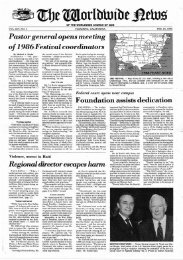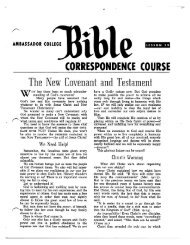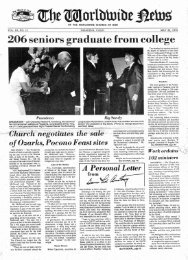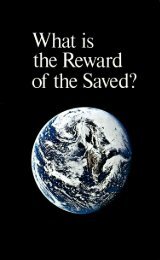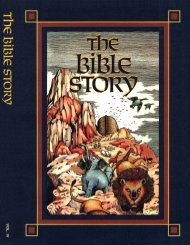Plain Truth 1978 (Prelim No 04) Apr - Herbert W. Armstrong
Plain Truth 1978 (Prelim No 04) Apr - Herbert W. Armstrong
Plain Truth 1978 (Prelim No 04) Apr - Herbert W. Armstrong
You also want an ePaper? Increase the reach of your titles
YUMPU automatically turns print PDFs into web optimized ePapers that Google loves.
Why<br />
Believe<br />
the<br />
Bible?<br />
OPERATING<br />
MANUAL<br />
FOR<br />
PLANET<br />
EARTH<br />
by John R. Schroeder<br />
Man's survival capabilities are<br />
now being weighed in the balance.<br />
Many heads ofstate, scientists,<br />
futurists, ecologists and<br />
others ofthe intelligentsia have<br />
already found them wanting.<br />
Twentieth-century man is in a<br />
state ofshipwreck and the prospects<br />
for viable lifeboats are very<br />
few indeed. But are we seek ing<br />
answers in the wrong places?<br />
Is there a long-forgotten formula<br />
found in an ancient collection<br />
ofdocuments that would assure<br />
human survival? Are we trying<br />
to operate the machine without<br />
the manual?<br />
Rcent surveys have shown tha t<br />
a t least 95 per cent of the<br />
American people claim they<br />
believe in God. Similar polls in<br />
other Western nations yield somewhat<br />
lower percentages in the sixties,<br />
seven ties and eight ies. Still, the<br />
vast majority of mankind in the<br />
Western world does appea r to believe<br />
in some kind of God.<br />
To some He is only a First Ca use<br />
who wound things up like a clock<br />
and then left the whole universe to<br />
tick away its eons without inter-<br />
32<br />
vention. But by whatever method<br />
this G od s ta r te d th e w hole<br />
process in the first place, does it<br />
make sense to us as ration al bein gs<br />
that He would have left mankind<br />
wi t hou t a ny b as ic ins tr uc tion<br />
book?<br />
A Prospective Manual?<br />
T here is no sho rtage of " holy<br />
books" wit h supposed messages<br />
from heaven. However, it would be<br />
only logical to begin our studies<br />
wi th the Book up on which th e<br />
dominant religion in the Western<br />
world is based.<br />
Despit e the fact that the Christian<br />
Bible is a consistent best-seller, it is<br />
not a document that world statesmen<br />
and politicians habitually consult<br />
as a handy probl em-solving<br />
manual. Usually it occupies the traditional<br />
spot on the family bookshelf<br />
and is superficially reveredbut<br />
virtua lly unt ouched.<br />
Few would dispute the rather<br />
sharp decline of biblical influence in<br />
our daily lives. Our secular education<br />
has generally precluded any ser<br />
io us study of the Sc ript u res.<br />
Religion is hardl y front-page news<br />
tod ay, and the counsel of its lead ers<br />
little valued. Even unskilled manual<br />
laborers ea rn higher wages than the<br />
ave rage clergyman.<br />
A big barrier to widespread acceptance<br />
of biblical teachings is the<br />
very beginning of the Book itself.<br />
Cha pter one, verse one of Genesis<br />
simply states: "In the beginning<br />
Go d created th e h e av en a n d<br />
th e earth ." But th o s e polled<br />
did not even rank crea tion among<br />
the top five theories adva nced to expl<br />
ain th e o rigin of the un iverse.<br />
The Christian eva ngelist has no<br />
sma ll problem on his hands. Co nvincing<br />
the world that Christia nity<br />
is really, after all, a religion of revelati<br />
on is no easy task. Th e world's<br />
secular viewpoint has alrea dy prejudiced<br />
most agai nst the theologian 's<br />
case . And of course the advoca tes of<br />
th e Christ ian religion have not<br />
presented a united front to the<br />
world. There is not even any uni versal<br />
agreement on what the Christian<br />
Bible actually teaches.<br />
So where do we begin in sorting<br />
out the problem of revelation?<br />
Where do we find the most<br />
agreemen t? Upon what person<br />
is the whole Christian religion<br />
built?<br />
Even those who belie ve much of<br />
the Bible to be myth still acknow ledge<br />
that God has manifested Himself<br />
in a unique manner through the<br />
person of Jesus Christ of Nazaret h.<br />
It is He who is the aut hor and the<br />
founder of the tru e Christian religion.<br />
His view of the Bible must be<br />
considered as decisive. We canno t<br />
lightly lay as ide His sta te me nts<br />
ab out crea tion.<br />
Jesus and Creation<br />
Was Jesus a *creati onist or a believer<br />
in evolution? For the an swer,<br />
not ice His description of world conditi<br />
ons at the end of this age. "For<br />
then there will be great tribul ati on,<br />
such as has not been from the begin <br />
ning ofthe world until now, no, and<br />
never will be" (Matt. 24:2 1, RSV).<br />
Mark 's Gos pel put s it this way:<br />
"For in those days there will be such<br />
tribulation as has not been from the<br />
beginning of the creatio n which God<br />
created until now, and never will<br />
be" (Mark 13: 19).<br />
Conside r too Jesus' own person al<br />
lett er to the Laodicean Church in<br />
the 90's A.D. <strong>No</strong>tice how He describes<br />
Himself: "And to the angel<br />
of the church in Laod icea write:<br />
'The words of the Amen, the faithful<br />
and tru e witness, the beginnin g of<br />
God's creation' " (Rev. 3:14). Oth er<br />
New Testam ent scriptures make it<br />
plain that Christ is the originator<br />
and source of all God's creation .<br />
Paul described Jesus as "the image<br />
of the invisible God, the firstborn<br />
of all crea tion; for in him all<br />
things were created, in heaven and<br />
on ea rth, visible a nd invisibl e,<br />
whether thrones or dominions or<br />
princip al it ies or a uthorities-all<br />
things were created through him<br />
and for him" (CoL I: 15-16).<br />
So if we accept the New Testament<br />
record as authoritative, we can<br />
come to no other conclusion tha n<br />
that Jesus literally believed cha pter<br />
one, verse one of the book of Genesis,<br />
i.e., the simple statement that<br />
"in the beginn ing God crea ted the<br />
heaven and the earth." D<br />
'The term " creationist" as used here refers<br />
to bel ief in the literal interpretation of<br />
Ge nesis I:1.<br />
The PLAIN TRUTH <strong>Apr</strong>il <strong>1978</strong>









